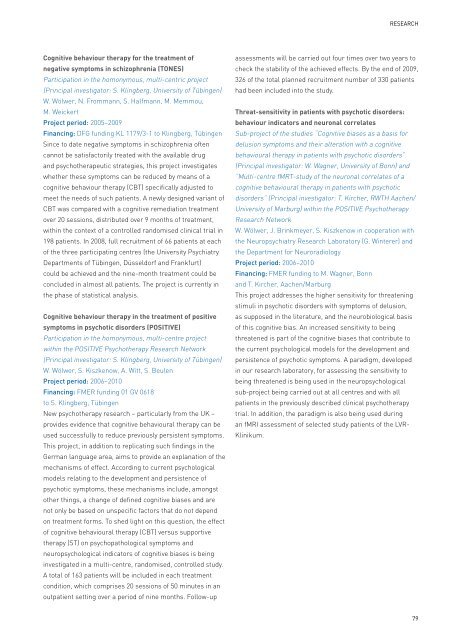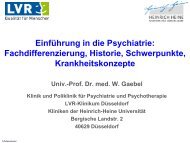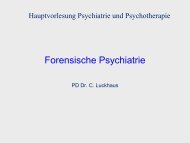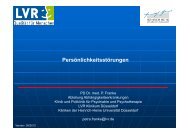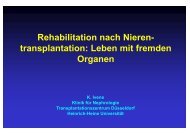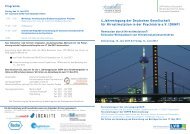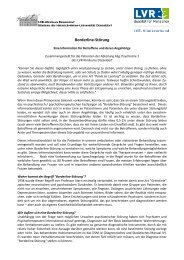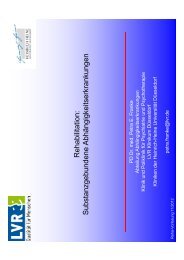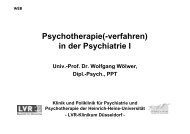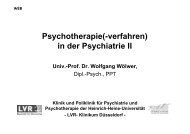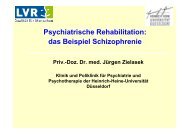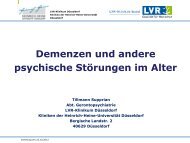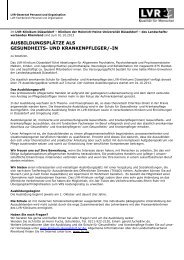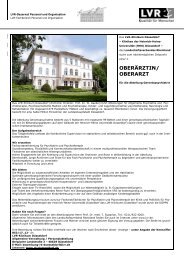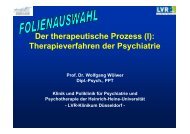LVR-Klinikum Düsseldorf Hospital of the Heinrich-Heine University ...
LVR-Klinikum Düsseldorf Hospital of the Heinrich-Heine University ...
LVR-Klinikum Düsseldorf Hospital of the Heinrich-Heine University ...
Create successful ePaper yourself
Turn your PDF publications into a flip-book with our unique Google optimized e-Paper software.
Cognitive behaviour <strong>the</strong>rapy for <strong>the</strong> treatment <strong>of</strong><br />
negative symptoms in schizophrenia (TONES)<br />
Participation in <strong>the</strong> homonymous, multi-centric project<br />
(Principal investigator: S. Klingberg, <strong>University</strong> <strong>of</strong> Tübingen)<br />
W. Wölwer, N. Frommann, S. Halfmann, M. Memmou,<br />
M. Weickert<br />
Project period: 2005–2009<br />
Financing: DFG funding KL 1179/3-1 to Klingberg, Tübingen<br />
Since to date negative symptoms in schizophrenia <strong>of</strong>ten<br />
cannot be satisfactorily treated with <strong>the</strong> available drug<br />
and psycho<strong>the</strong>rapeutic strategies, this project investigates<br />
whe<strong>the</strong>r <strong>the</strong>se symptoms can be reduced by means <strong>of</strong> a<br />
cognitive behaviour <strong>the</strong>rapy (CBT) specifically adjusted to<br />
meet <strong>the</strong> needs <strong>of</strong> such patients. A newly designed variant <strong>of</strong><br />
CBT was compared with a cognitive remediation treatment<br />
over 20 sessions, distributed over 9 months <strong>of</strong> treatment,<br />
within <strong>the</strong> context <strong>of</strong> a controlled randomised clinical trial in<br />
198 patients. In 2008, full recruitment <strong>of</strong> 66 patients at each<br />
<strong>of</strong> <strong>the</strong> three participating centres (<strong>the</strong> <strong>University</strong> Psychiatry<br />
Departments <strong>of</strong> Tübingen, <strong>Düsseldorf</strong> and Frankfurt)<br />
could be achieved and <strong>the</strong> nine-month treatment could be<br />
concluded in almost all patients. The project is currently in<br />
<strong>the</strong> phase <strong>of</strong> statistical analysis.<br />
Cognitive behaviour <strong>the</strong>rapy in <strong>the</strong> treatment <strong>of</strong> positive<br />
symptoms in psychotic disorders (POSITIVE)<br />
Participation in <strong>the</strong> homonymous, multi-centre project<br />
within <strong>the</strong> POSITIVE Psycho<strong>the</strong>rapy Research Network<br />
(Principal investigator: S. Klingberg, <strong>University</strong> <strong>of</strong> Tübingen)<br />
W. Wölwer, S. Kiszkenow, A. Witt, S. Beulen<br />
Project period: 2006–2010<br />
Financing: FMER funding 01 GV 0618<br />
to S. Klingberg, Tübingen<br />
New psycho<strong>the</strong>rapy research – particularly from <strong>the</strong> UK –<br />
provides evidence that cognitive behavioural <strong>the</strong>rapy can be<br />
used successfully to reduce previously persistent symptoms.<br />
This project, in addition to replicating such findings in <strong>the</strong><br />
German language area, aims to provide an explanation <strong>of</strong> <strong>the</strong><br />
mechanisms <strong>of</strong> effect. According to current psychological<br />
models relating to <strong>the</strong> development and persistence <strong>of</strong><br />
psychotic symptoms, <strong>the</strong>se mechanisms include, amongst<br />
o<strong>the</strong>r things, a change <strong>of</strong> defined cognitive biases and are<br />
not only be based on unspecific factors that do not depend<br />
on treatment forms. To shed light on this question, <strong>the</strong> effect<br />
<strong>of</strong> cognitive behavioural <strong>the</strong>rapy (CBT) versus supportive<br />
<strong>the</strong>rapy (ST) on psychopathological symptoms and<br />
neuropsychological indicators <strong>of</strong> cognitive biases is being<br />
investigated in a multi-centre, randomised, controlled study.<br />
A total <strong>of</strong> 163 patients will be included in each treatment<br />
condition, which comprises 20 sessions <strong>of</strong> 50 minutes in an<br />
outpatient setting over a period <strong>of</strong> nine months. Follow-up<br />
ReseaRch<br />
assessments will be carried out four times over two years to<br />
check <strong>the</strong> stability <strong>of</strong> <strong>the</strong> achieved effects. By <strong>the</strong> end <strong>of</strong> 2009,<br />
326 <strong>of</strong> <strong>the</strong> total planned recruitment number <strong>of</strong> 330 patients<br />
had been included into <strong>the</strong> study.<br />
Threat-sensitivity in patients with psychotic disorders:<br />
behaviour indicators and neuronal correlates<br />
Sub-project <strong>of</strong> <strong>the</strong> studies “Cognitive biases as a basis for<br />
delusion symptoms and <strong>the</strong>ir alteration with a cognitive<br />
behavioural <strong>the</strong>rapy in patients with psychotic disorders”<br />
(Principal investigator: W. Wagner, <strong>University</strong> <strong>of</strong> Bonn) and<br />
“Multi-centre fMRT-study <strong>of</strong> <strong>the</strong> neuronal correlates <strong>of</strong> a<br />
cognitive behavioural <strong>the</strong>rapy in patients with psychotic<br />
disorders” (Principal investigator: T. Kircher, RWTH Aachen/<br />
<strong>University</strong> <strong>of</strong> Marburg) within <strong>the</strong> POSITIVE Psycho<strong>the</strong>rapy<br />
Research Network<br />
W. Wölwer, J. Brinkmeyer, S. Kiszkenow in cooperation with<br />
<strong>the</strong> Neuropsychiatry Research Laboratory (G. Winterer) and<br />
<strong>the</strong> Department for Neuroradiology<br />
Project period: 2006–2010<br />
Financing: FMER funding to M. Wagner, Bonn<br />
and T. Kircher, Aachen/Marburg<br />
This project addresses <strong>the</strong> higher sensitivity for threatening<br />
stimuli in psychotic disorders with symptoms <strong>of</strong> delusion,<br />
as supposed in <strong>the</strong> literature, and <strong>the</strong> neurobiological basis<br />
<strong>of</strong> this cognitive bias. An increased sensitivity to being<br />
threatened is part <strong>of</strong> <strong>the</strong> cognitive biases that contribute to<br />
<strong>the</strong> current psychological models for <strong>the</strong> development and<br />
persistence <strong>of</strong> psychotic symptoms. A paradigm, developed<br />
in our research laboratory, for assessing <strong>the</strong> sensitivity to<br />
being threatened is being used in <strong>the</strong> neuropsychological<br />
sub-project being carried out at all centres and with all<br />
patients in <strong>the</strong> previously described clinical psycho<strong>the</strong>rapy<br />
trial. In addition, <strong>the</strong> paradigm is also being used during<br />
an fMRI assessment <strong>of</strong> selected study patients <strong>of</strong> <strong>the</strong> <strong>LVR</strong>-<br />
<strong>Klinikum</strong>.<br />
79


